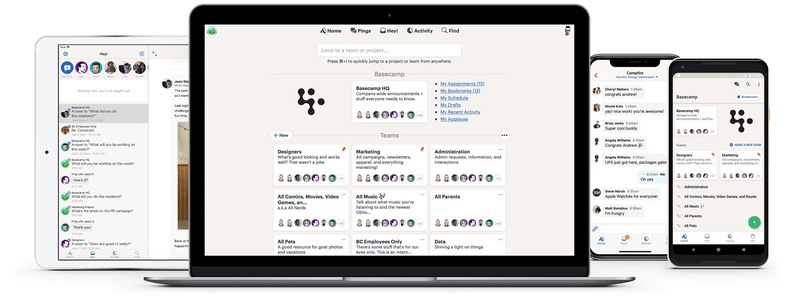Deciding which project management software to use for your team can be a huge decision. You need a piece of kit that meets your work needs, is usable by your staff, and fits smoothly with your team’s vibe. And this can be an enormous challenge.
In this article, we’ll discover how popular project management system Basecamp measures up, its advantages and disadvantages, to help you decide if it is the best fit for your team. Let’s get going.
About Basecamp 🎓
Think of Basecamp as a tiny, open concept office. There's a whiteboard, a calendar, different projects going on at the same time, discussions, etc., and the information is shared freely between everyone who is interested; boosting creativity and communication.
This is the essence of what Basecamp is all about.

Basecamp is a project management tool that places a huge focus on in-team communication and collaboration. Originally founded in 1999 under the brand name 37signals, the company began to direct their attention towards creating this one-of-a-kind project management tool in 2004.
Since then, it hasn’t stopped growing. In 2019, the company counts over 3 million accounts of users who engage in Basecamp’s project management platform.
These are some of the top features that have made Basecamp so popular:
- To-do lists – Create lists, set tasks and add due dates. Basecamp helps you get work organized and done, and even reminds your team if tasks are falling behind.
- Message boards and group chats – Helps ensure your team communicates better with conversation boards grouped together by topic. Chat functions allow easy @ mentions to keep your comms in one place.
- Scheduling – Plan your working progress with an easy-to-use schedule. Add events, integrate with Google Calendar (among others) and ensure your people remain notified.
- Document storage – Keep your files in order with online document and file storage.
- Client access – Give your clients access to the work that concerns them without risking your wider project management.
- Chart your progress – Keep an eye on your project’s progress in an easy-to-visualize graph form that shows how your team is doing.
Additional features include direct messages, email forwards, reports, notifications, and search.
Advantages of Basecamp 👍
Discover why you should consider placing your project management trust in Basecamp:
- Easy, guided setup – Like most PM systems, Basecamp is fairly easy to set up and get going. Just enter a few details and away you go. What sets it apart is, on registration, you’ll see a video pop-up to help you get started.
- Handy payment system – There’s no hierarchy of payments and add-ons here. Basecamp offers a simple, understandable payment system—$99 per month for unlimited access and unlimited users.
- Bring your clients and freelancers onboard – Most project systems are closed to help prevent access by clients or freelancers out of the main system. Basecamp takes a different approach; by allowing limited access, you can cooperate with your external partners seamlessly and without security worries.
- Focus mode activated – We’ve all had those times when we’ve had trouble concentrating. Basecamp recognizes this and has prepped with “focus mode” allowing users to turn off notifications and banners for a set period of time to concentrate better.
- Collaborate, communicate and check-in – Basecamp focuses heavily on boosting team communication. Its main strength is its ability to combine task management with notifications, chats, and check-ins to help keep the team productive and working together.
Drawbacks of the system 🤔
You can’t win ‘em all. These are the drawbacks users are mentioning about Basecamp:
- No freebies here – Aside from a 30-day free trial, there is no “free” mode with Basecamp—you’re either in, or you’re out. Which this seems pretty strict, remember that unlike other systems there are no additional fees for extras or adding more staff.
- Interface confusion – Unlike the smoothness of Asana and the Zen of Trello, Basecamp’s interface can initially seem a little complicated; however, the system’s reviewers promise that once you get used to it, it’s really very simple.
- Needs a reporting tool boost – While Basecamp excels in communication, it may be lacking (for some users) in its report-generating capability. Reports do exist, but may not be as intense as other systems, so if your team is heavily stat-based, this may not be an option for you.
Who is Basecamp for?
Basecamp is a perfect platform for startups, small- and medium-sized businesses looking to put their working process in order and collaborate to achieve new heights in business.
It’s perfect for small project teams and especially those working with external people such as clients or freelancers who they need to share work with but don’t want to be involved in all project management areas.
The platform is suitable for those seeking small, delightful extra touches that make it clear just how passionate its creators are, not only regarding productivity but in creating healthy workflows that are vital to the modern workplace.
Are there any alternatives to Basecamp? 🔍
While Basecamp makes sense for many businesses, it isn’t the only project management tool on the market. Discover how the system fairs against some of its closest competitors in our quick comparisons to help you get to grips with which is best for you:
- Basecamp vs. Trello – See how Basecamp measures up when compared to popular project management system Trello.
- Basecamp vs. Asana – Learn about the disadvantages and advantages of both Asana and Basecamp and find out which one meets your business’s needs.
The wrap-up
Basecamp is an efficient tool for teams that truly need to connect and communicate to get the work done. When it comes down to choosing a platform, our recommendation is to try it out before making a commitment. Basecamp offers a 30-day free trial where you can try out all the systems features and get to grips if it will work for you.
Sometimes, the choice of project management software isn’t about features; it’s about how well it gels with your team and current systems. Meaning the choice is as individual as your business.
P.S. Everhour integrates seamlessly with Basecamp, allowing you to track your time and monitor your project even better.
